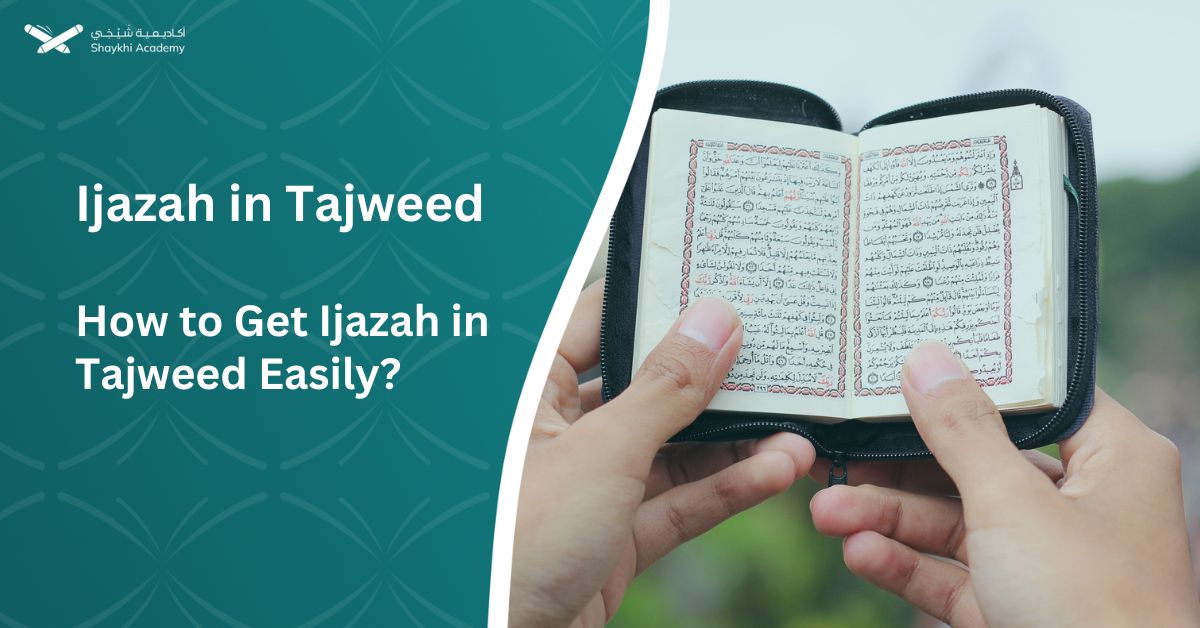To earn an Ijazah in Tajweed, immerse yourself in the rules of Tajweed through a qualified teacher, whether locally or via online platforms like Shaykhi Academy. Engage in regular practice and memorize Quranic verses, guided by an expert who refines your recitation.
Achieve proficiency, and your teacher may grant you the esteemed Ijazah, marking your mastery. This certification, rooted in a tradition dating back to the Prophet Muhammad, ensures the preservation of the Quran’s authentic recitation.
With various types of Ijazah validating different levels of expertise, it upholds the Quran’s sanctity and perpetuates the rich heritage of Islamic scholarship.
Quran Ijazah holds significant importance in Islamic tradition as it represents a chain of transmission that links the reciter back to the Prophet Muhammad (peace be upon him).
This certification is not merely a recognition of one’s memorization and recitation skills but also a testament to the authenticity and preservation of the Quranic text.
How to Get Ijazah in Tajweed?
To obtain an Ijazah in Tajweed, you should begin by learning the rules of Tajweed from a qualified teacher, either through local institutions or online courses such as Shaykhi Academy’s Quran Ijazah course.
Regular practice is essential for mastering the correct pronunciation and intonation of Quranic verses. Finding a knowledgeable teacher with an Ijazah in Tajweed is crucial, as they can provide guidance and correction. Attend Tajweed classes to receive structured lessons and feedback.
Memorizing portions of the Quran is often required, and once your teacher believes you have achieved proficiency, they may grant you an Ijazah.
What Is Ijazah in Tajweed?
Ijazah in Tajweed is a certification or license granted by a qualified teacher to a student who has demonstrated proficiency in reciting the Quran with correct pronunciation and intonation according to the rules of Tajweed.
It is a formal authorization that signifies the student has mastered the art of Quranic recitation and is qualified to teach others. The Ijazah is typically granted after the student has recited specific portions of the Quran to the teacher with accuracy and fluency.
The History of Ijazah in Islam:
The history of Ijazah in Islam can be traced back to the time of the Prophet Muhammad (peace be upon him) and his companions.
It started as a means of verifying the authenticity of the Quranic text and ensuring its correct recitation. Over time, it became a formalized system of certification in Quranic recitation, where students would study Tajweed rules under a qualified teacher and receive Ijazah upon mastery.
Ijazah serves as a way to transmit knowledge and authority from teacher to student, symbolizing scholarly achievement and authenticity in Quranic transmission.
Types of Ijazah in the Tajweed:
In Tajweed, there are several types of Ijazah that can be granted based on the level of proficiency and specialization:
1- Single Narration Ijazah:
This type of Ijazah involves certification in reciting the Quran according to a specific narration, such as obtaining certification in the Hafs narration from Asim.
2- Ijazah in the Ten Major Recitations:
This includes certification in reciting the Quran according to all ten major recitations, through a chain of transmission going back to the Prophet Muhammad (peace be upon him), such as the Tariqat Tuyoor al-Nashr.
3- Ijazah in the Three Supplemental Recitations:
This type includes certification in the three additional recitations beyond the ten major ones, namely the recitations of al-Durrah al-Mudiyyah, al-Shatibiyyah, and al-Durrah al-Sughra.
4- Ijazah in Memorization and Mastery:
This Ijazah is granted to those who have fully memorized and mastered the Quran, including Tajweed, according to one or more narrations from the ten readings.
5- Ijazah in Proficient Recitation:
This Ijazah is given to those who can proficiently recite the Quran by looking at the Mus’haf (the written Quran) while adhering to the rules of Tajweed, as well as having memorized one of the poetic meters of Tajweed or one of the Tajweed texts.
The Importance of Ijazah:
The importance of Ijazah in Tajweed lies in its role as a means of preserving the correct recitation of the Quran and ensuring its transmission from generation to generation.
Here are some key aspects of its importance:
1- Preservation of Authenticity:
Ijazah ensures the preservation of the authentic recitation of the Quran, as it is passed down through a chain of transmission (Isnad) that links back to the Prophet Muhammad (peace be upon him).
2- Authority and Authenticity:
Ijazah provides a mark of authenticity and authority for the reciter. It signifies that the reciter has learned the Quran from a qualified teacher and has been certified to recite it correctly according to the rules of Tajweed.
3- Continuity of Tradition:
Ijazah helps maintain the continuity of the Islamic scholarly tradition. By passing down knowledge from teacher to student in a formalized manner, Ijazah ensures that the art of Quranic recitation is preserved and transmitted to future generations.
4- Spiritual Connection:
For many Muslims, receiving Ijazah is a spiritual experience that deepens their connection to the Quran and the Prophet Muhammad (peace be upon him). It signifies a commitment to upholding the teachings of Islam and the traditions of the Prophet.
5- Teaching and Learning:
Ijazah enables the certified individual to teach others the correct recitation of the Quran. This helps spread knowledge of the Quran and Tajweed and ensures that future generations have access to qualified teachers.
6- Validation of Learning:
Ijazah serves as a validation of a student’s learning and mastery of Tajweed. It confirms that the student has fulfilled the requirements set by their teacher and is proficient in the rules of Quranic recitation.
7- Cultural and Historical Significance:
Ijazah has a rich cultural and historical significance in the Islamic tradition. It is a practice that has been upheld for centuries and is deeply rooted in Islamic scholarship and education.
8- Elevating the Status of the Quran:
By emphasizing the importance of correct recitation through Ijazah, Muslims uphold the status of the Quran as the literal word of God. It highlights the precision and beauty of the Quranic text.
9- Encouragement of Continuous Learning:
Seeking Ijazah is not the end of the journey but rather the beginning of a lifelong commitment to learning and improving one’s recitation. It encourages students to continue their studies and strive for excellence in Tajweed.
10- Community Recognition:
Ijazah is not just a personal achievement but also a recognition from the wider Muslim community. It shows that the individual is respected and trusted in matters of Quranic recitation, making them a valuable member of the community.
What Is Matn?
In the field of Tajweed, “matn” refers to the foundational text that presents the rules and principles of proper Quranic recitation in a structured and systematic manner.
These texts are essential for students and scholars studying Tajweed as they provide a clear and organized framework for understanding and applying the rules of recitation. Thus, the tutors of the Tajweed course at Shaykhi Academy usually utilize at least one of them.
1- Matn “Tuhfat al-Atfal” by Imam al-Jamzuri:
This text is popular among beginners and children due to its simplicity and clarity. It covers basic Tajweed rules, making it one of the main texts kids study in the Tajweed course for kids at Shaykhi Academy.
2- Matn “Al-Muqaddimah al-Jazariyyah” by Imam Ibn al-Jazari:
This text is more comprehensive and detailed, covering a wide range of Tajweed rules and principles. It is considered an intermediate-level text and is widely studied in traditional Islamic schools.
3- Matn “Al-Munfaddalat al-Shatibiyyah” by Imam al-Shatibi:
This text is known for its complexity and depth, addressing advanced topics in Tajweed and Quranic recitation. It is studied at an advanced level by those seeking a deeper understanding of Tajweed.
What Is Sanad?
Sanad in the context of Quranic recitation refers to the chain of transmission of a particular recitation (qira’ah) of the Quran.
It is the series of authorities or narrators who have transmitted the recitation, starting from the person who learned it directly from the reciter (sheikh) up to the Prophet Muhammad (peace be upon him).
The sanad serves as a validation of the authenticity of the recitation, ensuring that it has been transmitted accurately from generation to generation.
To receive certification in mastering the memorization of the Quran with Tajweed, one must recite and memorize the Quran without any errors, with the certification of the chain of transmission being authenticated.
How to get an Ijazah Online?
Obtaining an Ijazah in Quranic recitation online is possible through various reputable online Quranic learning platforms. Here is a general guide on how to get an Ijazah online:
1- Find a Reputable Online Quranic Learning Platform:
Look for online platforms that offer Ijazah programs taught by qualified and experienced teachers. Ensure that the platform has a good reputation and positive reviews from students.
2- Enroll in an Ijazah Program:
Once you have selected a platform, enroll in an Ijazah program. These programs are usually structured and may require you to attend live classes, submit recordings of your recitation, and complete assignments.
3- Study Tajweed and Quranic Recitation:
During the program, you will study Tajweed rules and practice Quranic recitation under the guidance of your teacher. You may also be required to memorize specific portions of the Quran.
4- Recite to Your Teacher:
Regularly recite Quranic passages to your teacher for evaluation and correction. Your teacher will assess your recitation skills and progress throughout the program.
5- Complete the Requirements:
Fulfill all the requirements of the Ijazah program, which may include memorizing specific portions of the Quran, demonstrating proficiency in Tajweed, and passing assessments.
6- Receive Your Ijazah:
Once you have successfully completed the program and met all the requirements, you will receive your Ijazah in Quranic recitation. This certification confirms that you have mastered the recitation of the Quran according to a specific narration (qira’ah) and its chain of transmission (sanad).
Enroll in our Online Ijazah Course Program today!
Learn from qualified instructors and receive personalized guidance to master the art of Tajweed and Quranic recitation.
Our comprehensive Quran Ijazah program includes live classes, one-on-one sessions, and practice sessions to help you perfect your recitation.
Join a community of dedicated learners and earn your Ijazah certification, connecting you to the noble tradition of Quranic recitation.
Enroll now and embark on a transformative learning experience!

Conclusion:
To obtain an Ijazah in Tajweed, start by learning Tajweed rules from a qualified teacher through local institutions or online courses, such as Shaykhi Academy. Consistent practice and memorization of Quranic verses are essential, along with guidance from a knowledgeable teacher who can correct your recitation. After achieving proficiency, your teacher may grant you an Ijazah, certifying your mastery in Tajweed.
Ijazah in Tajweed is a certification signifying a student’s proficiency in Quranic recitation according to Tajweed rules. It has historical roots tracing back to the Prophet Muhammad and serves as a means of preserving the Quran’s authentic recitation.
There are various types of Ijazah, ranging from single narration to mastery of multiple recitations, each validating different levels of expertise. Ijazah ensures the Quran’s accurate transmission, maintains Islamic tradition, and elevates the status of the Quran.
Quran Ijazah is not only a personal achievement but also a contribution to the preservation of the Quran for future generations, highlighting the timeless nature of this sacred text in Islamic practice and scholarship.

















































